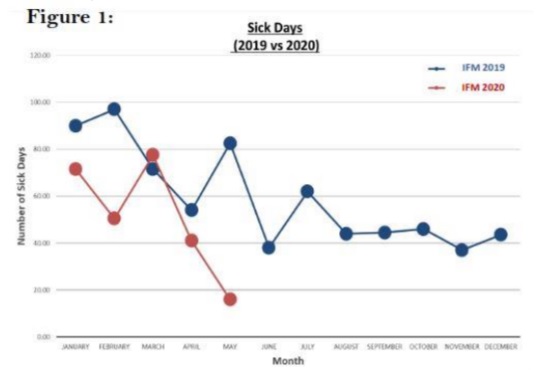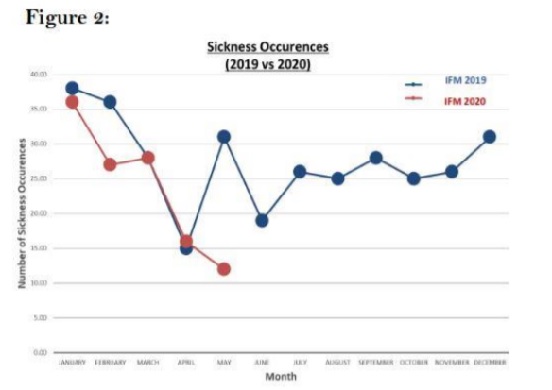In response to the COVID-19 pandemic, under the advice of the Government, many employers were forced to allow staff to work from home, significantly reducing the number of employees working from the office.
Across ISOLAS LLP and Fiduciary Management Ltd, we rapidly moved from a predominantly officeworking environment, to having 70% of staff within ISOLAS and 50% within Fiduciary working from home. As restrictions are now being lifted in Gibraltar, and our employees begin a phased return to the workplace, it is an opportunity for HR practitioners to consider what impact working from home has had on staff and wider business initiatives.
As a HR professional, providing internal support as well as offering an outsourced HR service through Fiduciary HR Solutions, I am interested in exploring this topic further. Most recently, my aim was to determine to what extent sickness levels had been affected by a change in working environment. As 50 to 70% of our staff were predominantly working from home due to the COVID pandemic, I was presented with a unique opportunity to explore this concept further.
In order to do this, I undertook an analysis of data from 2019, compared against the corresponding months in 2020. My main area of focus was in April and May, as these were the months where 50% -70% of our employees were predominantly working from home.
The results conveyed a significant drop in sickness levels; both sick days (figure 1) and number of sickness occurrences (figure 2) in 2020 compared with 2019. Most significantly, there was an 80.6% decrease in the number of sick days taken in May 2020, compared against May 2019, with a 61.3% decrease in sickness occurrences compared against the same month in the previous year


Upon realising these results, I undertook a further analysis of the 2020 data, comparing sickness levels between those working from home and those who remained working in the office. In April of this year, 90.25% of the total amount of sick days were taken by those who were working from the office, and 81.25% of sickness occurrences in April were from the same group. A similar trend followed in May, where 75% of sick days were taken by those in the office, along with 66.66% of sickness occurrences.
What caused the reduction in sickness?
This significant reduction in sickness levels appears to be a side effect of the lockdown period, and the evidence suggests that employees are less likely to report as sick if they are working from home. It is interesting to explore this theory further to try to understand why this trend may have occurred.
Are people who are working from home protected from the germs or viruses that may lurk in our offices? Is the lack of social contact an explanation for why those who remain at home do not get as sick? Or perhaps those who are working remotely are still getting sick, but just not reporting it, as they feel well enough to be able to continue to work from the comfort of their home?
The psychological aspect of working from home is also relevant when trying to understand the link between remote working and reduced sickness absences. The question needs to be raised: are people happier when they are working from home, compared with when they are working from an office? Much research suggests that this may well be the case, with one recent survey reporting that 44% of its remote working staff are happier at home (CNBC and SurveyMonkey).
Why is happiness relevant?
The causal interaction between happiness and health is well documented, with much scientific research indicating that being happy can have major benefits on your physical and mental health. Employee wellbeing, although not a new concept, has certainly seen a resurgence in interest from HR and business professionals alike in recent times. This is mainly because of the collective realisation that happy staff are healthier, and therefore more productive. Ultimately, if employees are happier when working from home, then this in itself may provide an explanation as to why their sickness levels are significantly reduced.
If employees are happier, more productive and healthier working from home, then shouldn't everyone just work from home?
Whilst these results are certainly encouraging, and could suggest a viable way for employers to reduce sickness related absences in the work place, it is important to highlight that these results only reflect a 2-month window of data. It is imperative to consider the psychological impact of working from home on a long-term basis. Prolonged reclusion from the office environment could potentially lead to feelings of isolation, and the lack of social interaction could potentially have detrimental psychological impacts on employee wellbeing. Ironically, this may result in employers experiencing more long-term sickness related absences in the future, particularly concerning mental health.
Food for thought...
The reduction in sickness levels over the COVID-19 pandemic period is interesting, and is certainly very relevant for employers to consider in the current climate.
I would be most curious to understand if other organisations have experienced similar trends in sickness data, and it will be most fascinating to continue to monitor sickness levels as everyone returns to working from a predominately office environment.
Originally published 07 August, 2020
The content of this article is intended to provide a general guide to the subject matter. Specialist advice should be sought about your specific circumstances.

